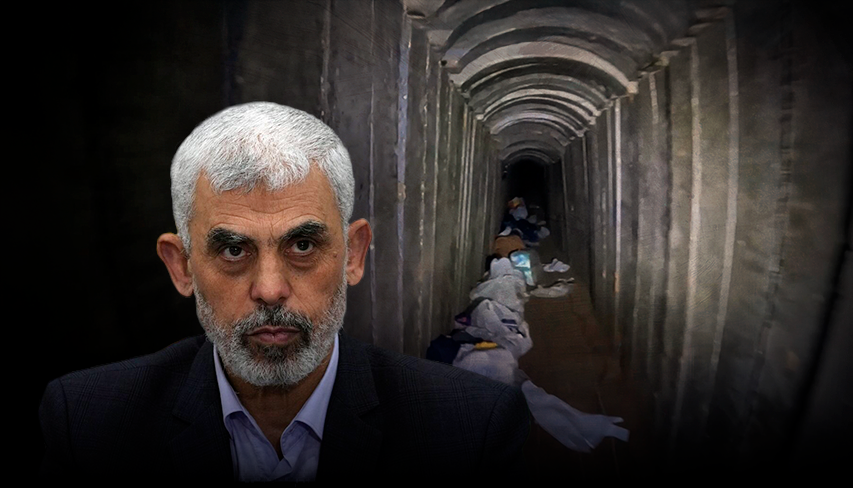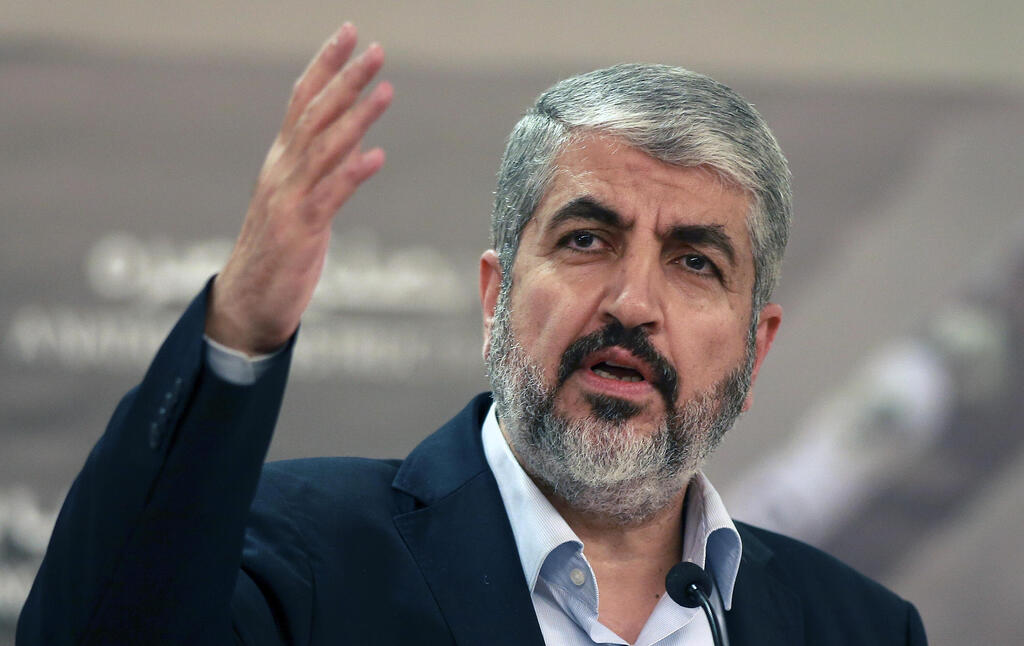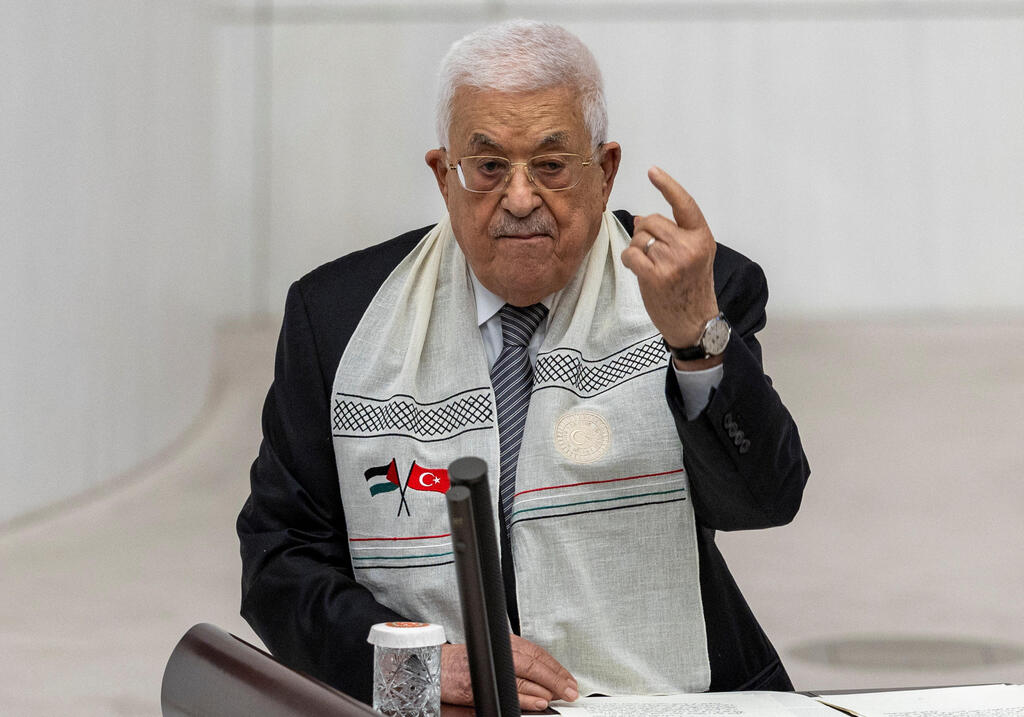Getting your Trinity Audio player ready...
Shin Bet pressed the IDF to continue operations in the area where Hamas leader Yahya Sinwar was killed, near the tunnel where six hostages were executed in Rafah.
Intelligence suggested senior Hamas leaders were hiding in the sector, sometimes even above ground. This assumption ultimately proved correct.
While there is satisfaction and even celebration over Sinwar's elimination, Israeli officials are aware that the new reality could bring risks, particularly for the remaining hostages held by Hamas, Palestinian Islamic Jihad (PIJ) and other terrorist groups in Gaza. Careless moves or premature announcements by Israel at this sensitive time could endanger the hostages.
The fact that Sinwar was killed in a direct confrontation with Israeli forces, rather than by an airstrike, may offer some solace to his fanatic supporters, potentially affecting their treatment of hostages.
However, the loss of a charismatic religious leader like Sinwar could also incite retaliation and spur desperate acts of revenge, especially from Gaza residents who saw him as a symbol or even a messianic figure.
The immediate concern is for the hostages, who are held by unpredictable factions. Their captors’ reactions to Sinwar’s death remain difficult to anticipate.
The successor
The future dynamics of Gaza, both in the short and long term, will largely depend on who succeeds Sinwar as Hamas leader in the Palestinian enclave and as head of the organization’s political bureau.
A key challenge is finding a figure in Gaza with communication channels open to all factions, particularly the Hamas terrorists holding Israeli hostages, and whose decisions are accepted by the various groups involved.
If Sinwar’s brother, Mohammed Sinwar, takes over, it is likely that he will be familiar with his late brother’s communication methods with Hamas leadership abroad, particularly in Doha, Qatar. This could enable Egypt and Qatar to establish contact with him.
However, Mohammed Sinwar may not command the same authority as his brother, making it harder for him to prevent the "privatization" of hostage control by families, organizations and armed groups in Gaza. Each of these groups may have its own ideas on how to use the hostages as leverage for their own interests.
Another potential successor is Az al-Din Haddad, commander of Hamas’ Gaza Brigade. One of the few surviving senior leaders of Hamas’ military wing, the al-Qassam Brigades, Haddad is known for his charisma and having survived several Israeli assassination attempts. If Haddad replaces Sinwar, his influence on the fate of the hostages could differ.
As a native of northern Gaza, Haddad is considered a commander of the region, including Gaza City, which is under heavy attack and siege by the IDF. He may be more open to negotiations involving easing conditions for northern Gaza residents in exchange for progress on hostage talks. This contrasts with Mohammed Sinwar, former Khan Younis commander, who is known for his ruthlessness and unwavering loyalty to his brother.
However, it is unclear whether Haddad has the same lines of communication with Hamas' external leadership as Sinwar did, or whether the various groups holding hostages would listen to him, viewing the hostages as their own "property."
On the other hand, Yahya Sinwar’s death could potentially work in favor of the hostages if their captors realize that their fate could mirror Sinwar’s unless they reach a deal with Israel.
The Gaza question
Sinwar’s killing has raised questions about how it will impact the achievement of Israel's war objectives and whether it will hasten the end of the war under conditions that ensure security for southern Israel. Sinwar’s death is expected to deliver a major blow to Hamas’ morale and, in the medium term, significantly reduce the terrorist group’s motivation to continue fighting.
Sinwar was seen as a mythic Islamic figure, and the loss of such a leader often dampens the resolve of his followers. Historical precedent suggests that the elimination of charismatic figures has long-term effects.
For example, PIJ struggled for a decade following the assassination of its leader Fathi Shaqaqi in Malta in the 1990s, carrying out few attacks during that time. Similarly, the killing of ISIS leader Abu Bakr al-Baghdadi in Iraq led to a retreat of ISIS terrorists from many areas they had controlled.
Sinwar’s removal could also embolden many displaced Gazans, now living in dire conditions along the coast in al-Mawasi, to rise up against Hamas, which has diverted humanitarian aid to fund its operations.
Both the reaction of Gaza’s population and Hamas terrorists' motivation will depend on who succeeds Sinwar. His brother, Mohammed Sinwar, known like his sibling as "Abu Ibrahim" after their father, is feared and brutal but lacks his brother’s charisma. Though he was once mentioned as a possible successor to Mohammed Deif after he was killed alongside the Khan Younis brigade commander, Mohammed Sinwar lacks the public authority of other potential leaders, such as Haddad.
IDF drone footage of Hamas leader Yahya Sinwar's last moments
(Video: IDF Spokesperson’s Unit)
It is unclear if either of them will be able to assert their authority over Gaza in a way that allows Hamas to maintain its civilian control over large parts of it. If Sinwar’s successor cannot impose order in Gaza or manage humanitarian aid distribution, the Palestinian enclave could descend into chaos, resembling the “Somalization” of Gaza, where power falls to whoever can assert the most force.
Such a scenario would pose a challenge to Israel and a threat to IDF forces, but it might also present an opportunity for Israel to step in, fill the power vacuum and dismantle Hamas’ control in Gaza once and for all.
Iranian influence
Sinwar was only recently appointed head of Hamas’ political bureau following the assassination of Ismail Haniyeh. His death leaves behind a critical question: Will Hamas maintain its close relationship with Iran’s mullahs in his absence?
During the Syrian Civil War, tensions ran high between Hamas, a Sunni Islamist group, and the Shiite leadership in Tehran, as well as Syria’s Alawite leader, Bashar al-Assad, who is aligned with Shiite Islam. Hamas was expelled from Damascus, where Khaled Mashal led the political bureau, after refusing to support Assad, who had provided refuge to Hamas’ leadership.
One of the top contenders to succeed Sinwar as political bureau chief is again Khaled Mashal, currently in Doha. Mashal has long opposed deepening ties with Iran, which could signal a shift in Hamas’ alliances, potentially distancing the group from Tehran and its so-called "Axis of Resistance." If Mashal reclaims the leadership role, Hamas may no longer align as closely with Iran’s network of proxies.
The uncertainty over Hamas’ leadership could also influence Israeli decision-making regarding potential retaliatory strikes on Iran. While theoretical chances of renewed negotiations might delay action, Israeli officials believe that waiting too long could undermine the legitimacy of a strike, as international attention may quickly fade from Iran’s October 1 missile attack.
Prime Minister Benjamin Netanyahu and the defense establishment argue that momentum should be seized and suggest that Sinwar’s elimination could actually accelerate plans for a strike.
Meanwhile, speculation grows over who might be the next target—perhaps Iran’s Revolutionary Guard commander Hossein Salami or even Supreme Leader Ali Khamenei himself.
The Palestinian Authority
Negotiations are currently underway between the Palestinian Authority (PA) and Hamas' overseas leadership to explore the possibility of establishing civilian governance in Gaza, as an alternative to Hamas' rule.
Sinwar’s vision had been for the PA, under Chairman Mahmoud Abbas, to return to Gaza after being ousted by Hamas in the 2007 coup. Under this arrangement, the PA would manage civilian affairs such as health, education and infrastructure, while Hamas would focus on rebuilding its military power to prepare for future attacks against Israel.
If Hamas now fully relinquishes its armed control over Gaza, it could present a significant dilemma for the Israeli government. Netanyahu, along with key political allies like Bezalel Smotrich and Itamar Ben-Gvir, are ideologically opposed to PA control in Gaza, fearing it could lead to the establishment of a unified Palestinian state in Gaza, the West Bank and East Jerusalem.
Much depends on whether Hamas can appoint a new leader to replace Sinwar, and who that leader will be. Only after this is clear can realistic predictions be made about the future.
For now, the news of Sinwar’s death is tempered by concerns for the fate of Israeli hostages and uncertainty over how, if at all, his death will impact the course of the war in Gaza.
Get the Ynetnews app on your smartphone:










